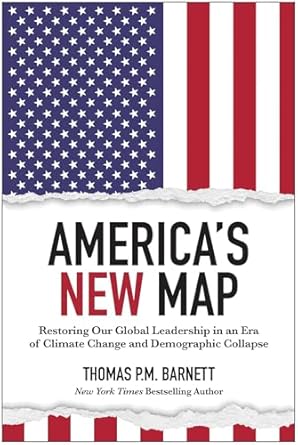As promised in my last post, here is a review of the new book by Thomas P. M. Barnett. It is called America’s New Map: Restoring Our Global Leadership in an Era of Climate Change and Demographic Collapse.
The subtitle is sort of ominous and optimistic at the same time. Ominous because it acknowledges an absence of global leadership in the face of drastic and potentially dangerous change in the near future. And optimistic because it suggests that America’s global leadership can be restored.
The book consists of many small chapters, over 40 in fact, grouped into seven sections called “throughlines.” The chapters in each throughline have a common theme, and each is fronted by a compelling pencil illustration. Often the chapters are introduced by citing another author’s work, after which Barnett expounds on some key concepts from the other author. In some ways the book is a synthesis of these other ideas.
As with his earlier work, Barnett presents a novel perspective on global affairs, inviting the reader to think outside of what might be considered the conventional narrative on current events. From this perspective, one sees long term outcomes that are not discernible when focusing on ongoing political turmoil or a looming Third World War. His throughlines are thus like paths being blazed through the undiscovered country of the future. I’ll try to summarize the view from his stratosphere, so to speak.
In his earlier work, also reviewed on this blog, Barnett identified the United States as a global Leviathan, the most militarily powerful of the “Core” states which comprised a globalizing world. Other “Gap” states, which were not integrated with the global economy, were the source of insecurity (“Terror” was the declared enemy). Integrating these nations (“shrinking the Gap”) was the logical strategic mission of the United States.
In his new book, Barnett acknowledges that the U.S. failed in that mission. Instead, we turned inwards, obsessed with fighting our Culture Wars to the bitter, bloody end. Globalization is a dirty word now, but as Barnett sees it, the dynamic is locked in. A huge new global middle class has arisen, primarily in the countries outside of the original grouping of “developed” states. We can start all the Trade Wars we want, but they will keep trading with one another, and we will become less and less the world’s “indispensable nation.”
Barnett also dismisses the idea of World War III. Conventional warfare among Great Powers was made obsolete by nuclear weapons, in his mind. Proxy wars like the one in Ukraine are what’s left, and even those are becoming less tenable because of advances in the deployment of cheap, unmanned weaponry.
The real strategic threat comes from climate change, and how it forces population movements. The middle latitudes around the equator are becoming less viable for human life, while the northernmost latitudes (and southernmost latitudes, but there isn’t much land area there) are becoming more habitable.
On top of climate change, we have demographics creating another pressure. The so-called “Global North” is the wealthier part of the world, and consists of aging populations with low fertility rates. Meanwhile, the “Global South” is just the opposite. So, in the decades to come, the bulk of the world’s working age population is going to be living in a part of Earth that is becoming less desirable to be in, looking northward to a part of the Earth that is becoming more desirable to be in (climatewise), and is also in need of workers.
One can easily see the conflict that these combined pressures will create. Barnett argues that this demands a new “vertical” orientation in strategic thinking, so that the United States can accomodate the restless population to its south. The new strategic mission is “North-South” integration, to replace the “Core-Gap” integration of his previous thinking. His dream is that we actually add new states to the union; why, he wonders, after adding new states decade by decade, did we stop at 50, just before he was born?
Arguably, the recent political history of America, including the current administration’s withdrawal from postwar strategic alliances and its preoccupation with the southern border, implicitly recognizes this strategic reality. Likewise with the administration’s unprecedented threats to conquer Canada and Greenland. There’s a logic to these “policies,” but we’d be better off with an approach that’s more intelligent and diplomatic, more accepting of the shape of modern society. Unfortunately, we are stuck with some real backassward political leadership, thanks to older generations living in the past, and trying to resurrect a long dead social order.
All five of the world’s superpowers – by Barnett’s reckoning, that’s the United States, the European Union, Russia, China and India – face this same strategic imperative. He describes a “superpower brand war,” in which each power comes to the rest of the world with its particular model of integration. Currently, the bellicose approach of the U.S. is losing ground to China’s more direct approach of simply trading infrastructure development for access to markets (look up “Belt and Road Initiative”).
It’s not too late for us, Barnett argues. We still have a popular brand, thanks to our global cultural dominance, and – recent troubles notwithstanding – to our American ideal of a truly equal society. We also have geographic advantages simply from being in the Western hemisphere, protected by oceans and rich in resources. It makes sense for the Americas (plural) to become more integrated. In the last few chapters of the book, Barnett presents alternate futures of American acceptance or American apartheid. He clearly believes the former to be preferrable (yes, he voted for Harris).
In summary, I found that this book got me thinking in new ways, and helped orient me in understanding current events – the same as with the author’s “Pentagon’s New Map” series in the early 2000s. I’m subscribed to Barnett’s substack, which has a steady stream of content, as he loves to write. His style is frank, often humorous, and peppered with pop culture references. His perspective is long term, realistic from his understanding, sometimes unsettling, and always eye-opening. I recommend it.
As usual, there is an abridged version of this book review on goodreads.

